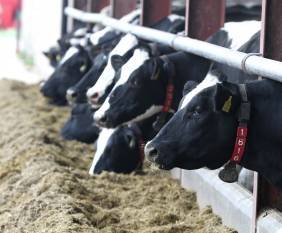DUNBOYNE/Ireland, 18 February 2021: The tightening of global protein supplies is creating uncertainty for producers and the feed industry alike as to where this year’s protein supply will come from. Add to that the ever-increasing pressure on producers to meet the growing global demand for milk and meat while also reducing their environmental impact and remaining financially viable.
While striking a balance between these seemingly conflicting goals may seem impossible, Alltech has released data from a new meta-analysis for ruminants that proves otherwise.
The results showed that Optigen, a non-protein nitrogen ingredient, can replace vegetable protein sources and enable dairy and beef producers to simultaneously improve animal performance, reduce their carbon footprint and increase profitability.
The new data from the meta-analysis examining the effects of Optigen supplementation in dairy cows is based on the results of 17 studies carried out in six different countries, while the beef study was based on the results of 17 studies carried out in nine different countries.
“The responsible sourcing of protein for animal feeds is a crucial global issue in the livestock supply chain, and the use of plant protein sources in animal diets can be restricted based on availability, price volatility and associated environmental impact,” Dr Saheed Salami, research fellow at Alltech said.
“These meta-analysis studies have confirmed that Optigen is a viable substitute for plant protein sources in ruminant rations, resulting in improved feed efficiency, profitability and environmental sustainability for dairy and beef production,” Dr Salami underlined.
Dairy research key findings:
- The use of Optigen in dairy diets resulted in a carbon savings of around 54 g of CO2-eq/kg milk.
- When extrapolated to the annual milk output of the Dutch dairy sector, for example, this would be equivalent to a carbon emission reduction of 574,004 tonnes of CO2-eq. Such a carbon saving represents 10 percent of the entire reduction target for agriculture and land use sectors required by the Dutch government by 2030.
- Optigen partially replaced approximately 21 percent of soybean meal across all diets.
- Dry matter intake (DMI), protein intake and nitrogen intake decreased through space “saving” in the diet
- Milk yield increased, and feed efficiency was improved by 3 percent in Optigen diets.
- Nitrogen utilization efficiency in dairy cows increased by 4 percent, thanks to improved nitrogen capture in the rumen. This translates to a reduction of the manure nitrogen excretion by 12 to 13 g of nitrogen/cow/day.
- This data suggests, for example, that the use of Optigen could reduce the annual manure nitrogen excretion from Germany’s dairy sector by an average of 17,028 tonnes of nitrogen based on the annual milk output.
- The environmental benefits Optigen brings are through the substitution of soybean and other high protein concentrates in combination with improved production efficiency.
Beef research key findings:
- The meta-analysis highlighted how the partial replacement of vegetable protein with Optigen exhibited a consistent improvement in the liveweight gains and feed efficiency of beef cattle.
- There was an 8 percent average increase in liveweight gain and an 8 percent improvement in feed efficiency with the inclusion of corn silage, enhancing the effects of Optigen.
- A simulation analysis based on these benefits indicated that feeding Optigen to 1,000 head of cattle with the goal of each animal gaining 440 pounds would:
- Reduce time to slaughter by nine days.
- Lower feed costs by USD $18,000.
- Decrease the carbon footprint of the beef unit by 111.5 tonnes of CO2-eq, contributing to a nearly 2.2 percent reduction in the carbon footprint of beef production.
“Vegetable protein sources are volatile; they fluctuate in price and their nutritional composition is incredibly variable, while Optigen is the opposite and provides consistency in the rumen-degradable protein supply that is critical for rumen function,” Dr. Vaughn Holder, ruminant research group director at Alltech said.
“These new meta-analyses on both beef and dairy animals show the depth of our research in both areas, as well as the versatility of the product across dietary raw materials and global geographies,” Dr Holder added.
As a concentrated nitrogen source, Optigen takes up less space in the diet compared to other nitrogen sources, such as soybean meal and rapeseed meal, leaving room for more rumen-friendly materials, such as homegrown forages. This additional space can also aid in allowing more energy into the diet.
In some cases, dietary crude protein levels can also be decreased, thereby increasing efficiency and reducing the risk of nutrient wastage. These studies reaffirm that feeding Optigen offers unique economic and environmental benefits to dairy and beef production and positively impacts our food supply chain.




















